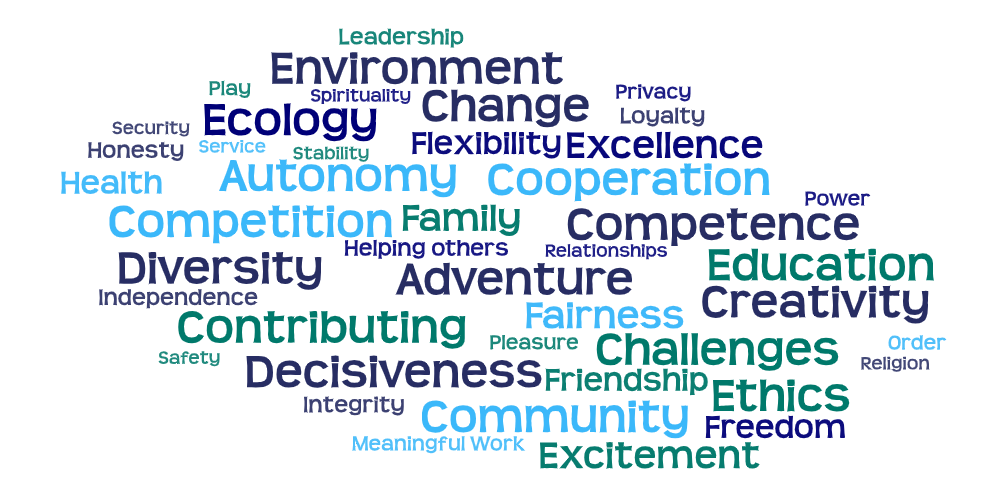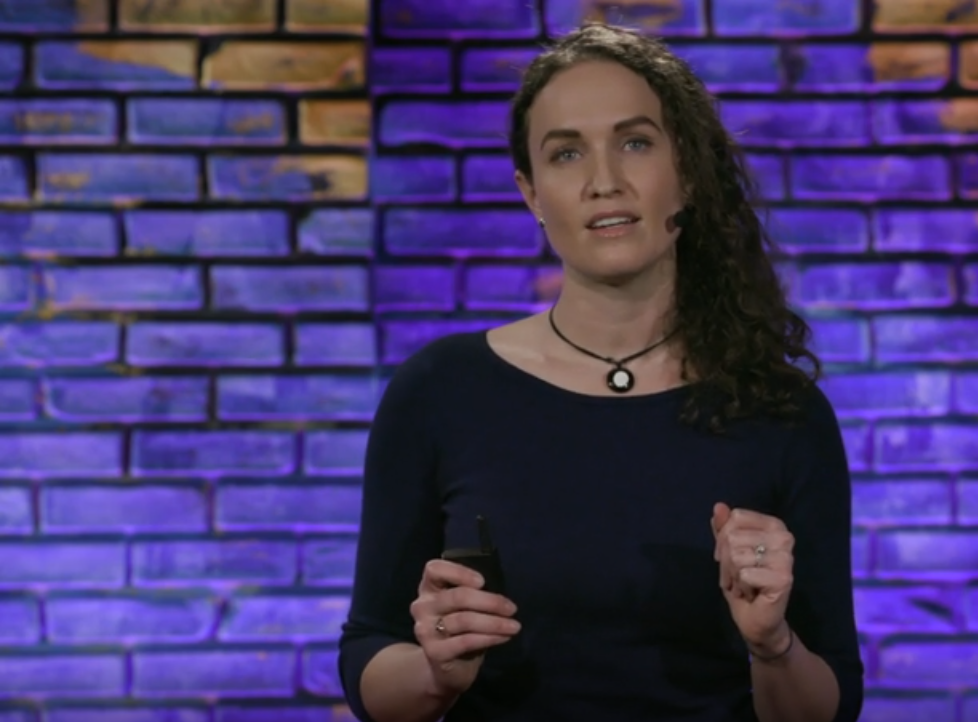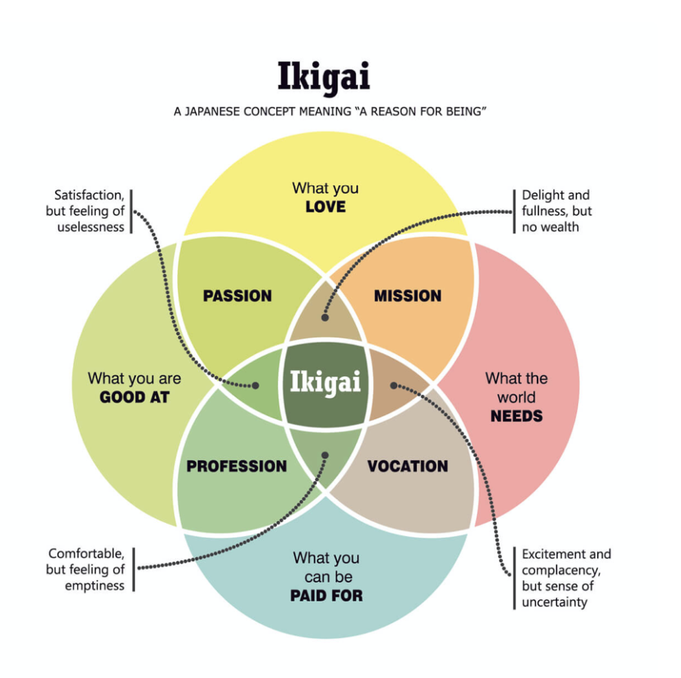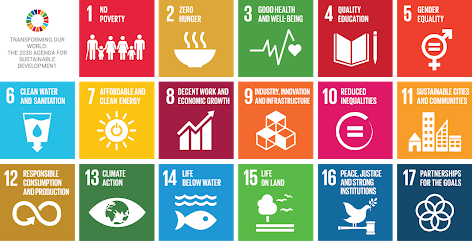Human needs, values,
and well-being
What do humans need?
What do you think is important for all or most humans to have in order to live a healthy and good life? What do you think are the elements that make a good life?
Think about this question and brain-strom and collect all the things that come to mind (remember, we are exploring what all humans need for a good life, not just what you think you might need currently). Think about material things but also non-material things.
Why do you think the thing is an important need for all human beings? What happens to human beings if this need is not fulfilled?
Try to sort the list of things into groups of similar things or categories.
Physical and basic material needs - what do we need to survive?
Humans are living beings, animals, mammals, social mammals, primates, humans. As such, we have evolved to require and seek certain things from our environments that sustain our lives, the lives of our offspring and of other creatures we depend on.
As living beings, we need water, oxygen, energy, and nutrients for our basic metabolism, to breath, move, grow, repair our bodies, and react to the world around us. We also need some basic safety from all the things that can harm us – such as other living beings and toxins.
As animals, we need food because this is where we get our energy and nutrients from. We also need sleep in order to maintain cognitive abilities and longevity.
As mammals, we need to live in certain kinds of temperatures.
As humans, we regularly need certain kinds of food that is made up of the kinds of nutrients we need, like proteins, minerals, and vitamins. We need a certain amount of sleep, about 6-9 hourse every day as adults. In order to fulfill our mammalian need for living under certain kinds of temperatures, we need shelter and clothes (after all, we humans are a cultural species who have adapted to life across all of the earth’s ecosystems through culture, as an extension of our bodies).
So is it enough for a “good life” if humans have access to these basic things in order to survive, to maintain our physiology and physical health? Is this all we care about in our lives?
Thought experiment: Imagine a world in which all humans have access to all the basic things they need to survive at all times. Nobody needs to do anything for it or worry about it. Would this be a utopian society, the perfect world, or is it a dystopia? Do we live in such a world? Would you be happy in this world? Why, or why not? Would something be missing in this world?
Psychological needs - what do we need to thrive?
As evolved creatures, we humans also have psychological needs – situtations or factors that contribue to our psychological health.
So our health and well-being is not just defined by physical health but also by mental health. In fact, mental health and physical health are greatly intertwined as mental health can affect our physical health and vice versa.
Think about what your psychological needs are. Beyond food, water, shelter, sleep, safety, what is it that makes a good life, one that is not just about surviving but about thriving? What do you think most people really need psychologically?
You can explore this question by observing more closely your well-being and your psychological state during a period of time. In what situations do you feel psychologically unwell, what is missing or what happened in those situations? In what situations do you feel psychologically well, what defines those situations?
Several researchers have tried to develop a list of human basic psychological needs. Here is a list of candidates:
- Autonomy – the need to have a sense of making one’s own choices, to do something because we choose to, not because we are forced to by others
- Competence – the need to feel competent at what we are doing, that we are capable and can succeed, that we can create certain outcomes
- Coherence and understanding – a need to feel that the world and one’s place in it “make sense”, to not have too much confusion and uncertainty
- Relatedness/Belonging/Connection – the need to feel a close connection with others
- Meaning/Purpose – the need to feel a sense of purpose and meaning in one’s life
- Feeling and experiencing – the need to feel and experience life in its fullest (the good and the bad)
Do you agree that these are the most important, and only, basic psychological needs of all humans? Observe your experiences over a period of time and note down when you sense the fulfillment or thwarting of these psychological needs.
Further reflection questions and project work ideas:
- Which of these psychological needs might other animals share with us, and why?
- What do humans (or other animals) do to fulfill their psychological needs?
- What do humans do when they do not have their psychological needs met?
- How can we find out if students and teachers in our school, or people in our community, have their psychological needs met or thwarted?
- Does our school or community help or hinder people in fulfilling their psychological neess? What can we do so that humans in our schools and communities can have their psychological needs met?
see also: Social (in)equality and well-being
Steve Rose: What Are Our Underlying Needs? https://steverosephd.com/what-are-our-underlying-needs/
This article explore six important psychological needs, what humans tend to do to fulfill these needs, how these sometimes don’t work so well, and how we can learn to better fulfill these needs.
Nature and human needs
Contact to nature does not usually feature among the lists of basic human needs. However, many studies found that experience in nature can have positive impacts on human physical and psychological health, and it might thus serve to fulfill important human needs. Conversely, lack of nature experience can have negative effects on human health and well-being.
How could we explain this effect on nature experience on humans? (see also Tinbergen’s questions)
- Evolutionary function: One proposed cause is that it is an evolved reaction to natural environments, which has also been called “Biophilia” – we humans evolved to find nature pleasant and thus to seek certain kinds of natural environments because for most of our evolutionary history we depended on lush and fertile natural enviornments for our survival and well-being – so we like to be in or watch green forests, rolling hills, flowing water, the ocean etc. But other scientists argue that our affinity to nature is not necessarily a result of evolution because of a significant function for our survival in the past, it might rather just be a kind of side effect.
- Proximate mechanism: The scenery and rhythms of nature make us feel calmness, awe, and we experience nature aesthetics as pleasing. For example, explore this “map of human emotions” from a study that explored the diversity of human emotional reactions to short video clips. Look for the cluster of videos rated for “calmness”, “aesthetic appreciation” and “awe” and watch some of the video clips. What do you notice?
- The reverse, i.e. the negative effects of lack of nature experience have sometimes been called “nature deficit disorder”.
So is our living in cities and houses and spending more and more time indoors something that is actually bad for us? Did we not evolve for this kind of lifestyle? Or can we easily adapt? What is the right mix of us spending time in natural and cultural environments?
see also: Mismatch / Disconnection between humans and nature
Lesson idea: Students discuss, create a survey in their school or community or find out for themselves to what degree experience in nature is important to human well-being. For example
- How often do you deliberately go into natural surroundings like parks, a forest, a mountain top, or a body of water in your area? Why do you do it?
- Students are prompted to go into a natural surrounding of their choice a certain amount of time during a few weeks (e.g. 30 min every day, 1 hour 3 times a week) and note down in a diary what they experience, and how it made them feel.
- Students visit a local park or nature reserve and interview visitors about their motivations for being there.
Values
Related to human psychological needs for thriving is the concept of human values.
What is a value? How would you define it? What characterizes a value? What are some examples of values?
Are values the same as goals? If not, how are they different?
Are values the same as “feeling good” or “having fun”? If not, how are they different?
How do we identify our values?
How are values related to human needs?

Exploring values
This lesson is about exploring the concept of values with students and having them identify and reflect on what they personally value, or what makes their life meaningful.
Values Domains and ways to well-being
Even if there will be variation between what individuals consider more or less important and meaningful in their lives (and throughout life, this will also change for individuals), humans also tend to value similar kinds of things and activities. This is because, even if everyone of us is unique, all humans also have a lot of things in common because of our common evolutionary history. We evolved to find certain things important that will keep us safe and well. And so the kinds of activities we value often have to do with things that were important for our survival and well-being throughout our evolutionary history – they are often related to fulfilling our psychological needs.
The following “values domains” have been identified to represent the kinds of things that are important to most people and that have an influence on our well-being (Aked et al., 2008; Hayes & Ciarrochi, 2015):
- connecting with others (family, friends, romantic, …)
- giving to others and having a positive influence (community, citizenship,…)
- being active
- embracing the moment
- challenging ourselves and learning
- caring for ourselves
How might these relate to fulfilling our basic physiological and psychological needs (see above)? What kinds of things do humans do to fulfill and live towards these valued domains?
Our language, thought, and mental time travel can make us lose sight of these things, so it can be helpful to “be reminded” or to “re-notice” what kinds of activities are meaningful to us.
Additional reflection questions:
- Can an activity fulfill several of the six important domains for someone? (Yes, e.g. going to a music concert can be both about connecting with people and about embracing the moment; studying medicine can be both about having a positive influence and about challenging oneself)
- Can an activity fulfill different values domains and psychological needs for different people? (Yes, e.g. taking up a new sport can be more about challenging oneself and being competent for one person, and more about caring for oneself to another person, or more about connecting with other people for yet another person)
- Is there something important and meaningful to you in life that does not quite fit into any of these six values domains? How would you call this additional domain?
Values domains sorting activity
This activity lets students explore the six different values domains by considering why we humans might have evolved to find these areas of life meaningful and important, and what kinds of different things we can do to live towards these valued domains.
World Values Survey
An importat global survey that explores cultural differences in human values and traditions is the World Values Survey. Since 1981, people from about 80 countries across all inhabited continents are asked a range of questions about their values, revealing the influence of culture (cultural history), religion, economic prosperity, socio-economic security, personal freedom, and age on the kinds of things that people find important in life.
“[F]ading existential pressures open people’s minds, making them prioritize freedom over security, autonomy over authority, diversity over uniformity, and creativity over discipline …. the existentially relieved state of mind is the source of tolerance and solidarity beyond one’s in-group; the existentially stressed state of mind is the source of discrimination and hostility against out-groups.”
(Welzel, 2013: Freedom Rising)
What do you think about this quote? Do you agree with it? How does it relate to your own experience or to events in society?
see also:

True stories of people who left radical movements
In this unit students explore stories of people who have left a radical movement, or deliberately discuss with representatives of the “other side” and build respectful relationships. These let us explore the circumstances, experiences and insights about why prejudice, hatred and violence against other people or a group can arise and how they can dissolve again.
So what is well-being and a good life?
Even when the fulfillment of psychological needs and valued living are related to human well-being, we might not think about well-being or “a good life” in this way.
Studies found that humans can have different ideas about well-being, including: the experience of pleasure; avoidance of negative experience; self-development; and contribution to others (McMahan & Estes, 2011). An understanding of well-being that emphasizes experience of pleasure and absense of negative experience is often called hedonistic, while understandings of well-being that emphasize self-development and contributing to the community are often called eudaimonic.
Studies also found that people who understand well-being to be more about self-development and contributing to others (a eudaimonic understanding of well-being), actually tend to experience more well-being and including satisfaction with life.
Why might this be? It seems that our concepts and beliefs about our own experience matter – they influence how we interpret our experience, how we react to them, and the kinds of behaviors we might engage in in our pursuit of “a good life”.
Beliefs About Well-Being Scale
In this questionnaire, people are asked about their beliefs about well-being by indicating the degree to which they believe that certain aspects are a necessary and required aspect of the experience of high well-being and living the good life. It is based on a study that showed that people’s beliefs about wellbeing can affect their actual wellbeing.
In a long-term study by Harvard University, researchers followed the lifes of people since 1930. In this talk, Robert Waldinger talks about findings from the study.
https://news.harvard.edu/gazette/story/2017/04/over-nearly-80-years-harvard-study-has-been-showing-how-to-live-a-healthy-and-happy-life/
Classroom idea: Interview older people in your family or community to find out what they think makes a good life. Collect the answers from the different interviews to find common themes or surprising and unique aspects. What is the most important thing you learned from these interviews?
One reason that people might have ideas about well-being that might not be helpful is because of language and culture. Our culture might reinforce ideas about what makes a good life that are more or less aligned with this eudaimoic idea of well-being (see also: Emotions and wellbeing).
There is not really a word in the English language that describes the feeling or state we are in when all our psychological needs are met, or when we are living towards our values and purpose even in the presence of painful experience. The English words “happiness” or “bliss” or the German word “Glück” can rather reinforce the idea that well-being is mostly about feeling good or about fortune.
- Our obsession with happiness is making our kids miserable. Andrea Bonior, Washington Post. https://www.washingtonpost.com/lifestyle/2021/02/23/kids-happiness-emotions/
But the Japanese concept of Ikigai might be a candidate of a word that captures it. It translates to something like “reasons for being” or “what makes life worth living”.
Read the Wikipedia article on Ikigai and look at the image on the right to answer this question:
How does the concept Ikigai relate to, describe or entail the fulfillment of human psychological needs of autonomy, competence, relatedness, and purpose?

Sustaining human needs, values, and well-being
The Sustainable Development Goals (SDGs) are one set of things developed by the United Nations that we as a global community need to achieve and maintain so that all humans can thrive.
How do the SDGs relate to human physical/physiological and psychological needs and values?
Which SDGs do you consider the most important? Why? How does it relate to your life and to your values?
Is something missing in the SDGs? Do the SDGs cover something that would not be considered part of what humans need and value?
What SDG would you want to add to this list of 17 developed by the United Nations?

Explore the SDGs and their specific targets here: https://sdgs.un.org/goals
Measuring human well-being
Many different measures have been developed to measure human well-being.
Should and could we regularly ask all humans, in our school, in our community/country, in the world, how they are doing?
Lesson or project ideas:
- Students work in groups to explore certain existing measures of human well-being. See Present and Future / Measuring what matters
- Students create a survey to ask people in their school about their well-being, integrating concepts of physiological and psychological needs, well-being, and values.
(Note: We are currently developing lesson materials and tools for measuring well-being in school)
References
- Aked, J., Marks, N. A., Cordon, C., & Thompson, S. (2008). Five Ways to Wellbeing. New economics foundation. https://doi.org/10.7748/ns2013.04.27.34.29.s38
- Gardiner, G., Lee, D., Baranski, E., & Funder, D. (2020). Happiness around the world: A combined etic-emic approach across 63 countries. PLoS ONE, 15(12 December), 1–31. https://doi.org/10.1371/journal.pone.0242718
- Hayes, L. L., & Ciarrochi, J. (2015). The thriving adolescent. Using Acceptance and Commitment Therapy and Positive Psychology to help teens manage emotions, achieve goals, and build connections. Oakland, CA, USA: Context Press.
- McMahan, E. A., & Estes, D. (2011). Measuring Lay Conceptions of Well-Being: The Beliefs About Well-Being Scale. Journal of Happiness Studies, 12(2), 267–287. https://doi.org/10.1007/s10902-010-9194-x
- Steger, M. F., Kashdan, T. B., & Oishi, S. (2008). Being good by doing good: Daily eudaimonic activity and well-being. Journal of Research in Personality, 42(1), 22–42. https://doi.org/10.1016/j.jrp.2007.03.004
- Tay, L., & Diener, E. (2011). Needs and Subjective Well-Being Around the World. Journal of Personality and Social Psychology, 101(2), 354–365. https://doi.org/10.1037/a0023779
- Vansteenkiste, M., Ryan, R. M., & Soenens, B. (2020). Basic psychological need theory: Advancements, critical themes, and future directions. Motivation and Emotion, 44(1), 1–31. https://doi.org/10.1007/s11031-019-09818-1
- Welzel, C. (2013). Freedom Rising: Human Empowerment and the Quest for Emancipation. New York: Cambridge University Press. New York, NY, USA: Cambridge University Press.
- https://steverosephd.com/what-are-our-underlying-needs/
- https://news.harvard.edu/gazette/story/2017/04/over-nearly-80-years-harvard-study-has-been-showing-how-to-live-a-healthy-and-happy-life/
- https://www.scientificamerican.com/article/why-did-sleep-evolve/
- https://www.forbes.com/sites/quora/2018/02/05/six-fundamental-human-needs-we-need-to-meet-to-live-our-best-lives/
- http://www.oecdbetterlifeindex.org/
- https://www.psychologytoday.com/intl/blog/curious/201710/how-many-ways-can-we-measure-well-being
- https://www.forbes.com/sites/mishagajewski/2020/12/09/turns-out-we-dont-really-know-how-to-measure-happiness/



